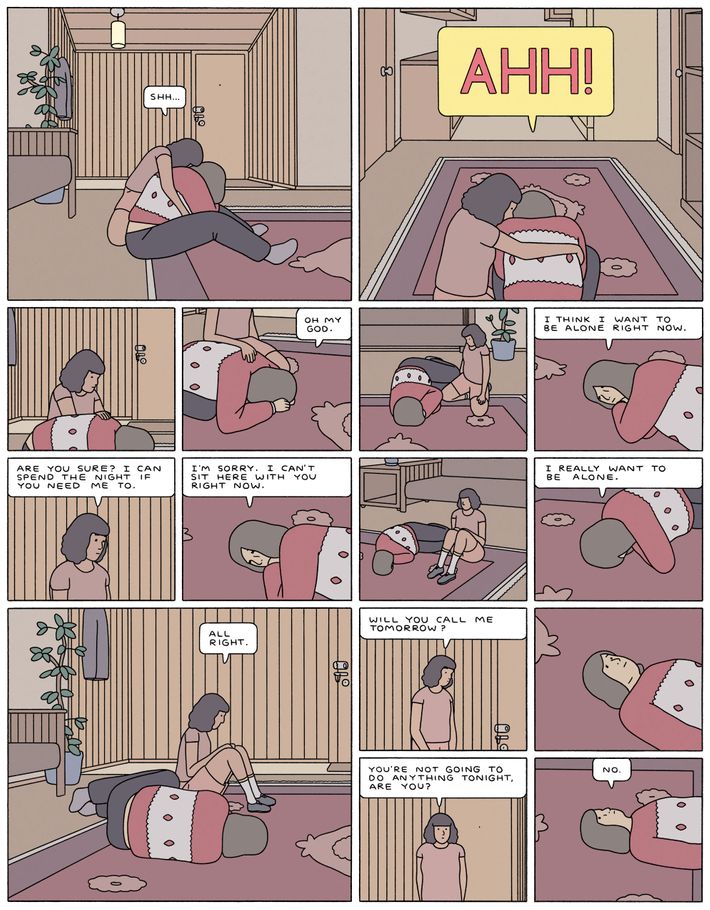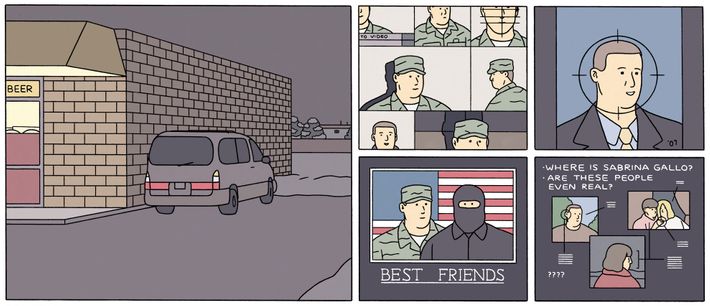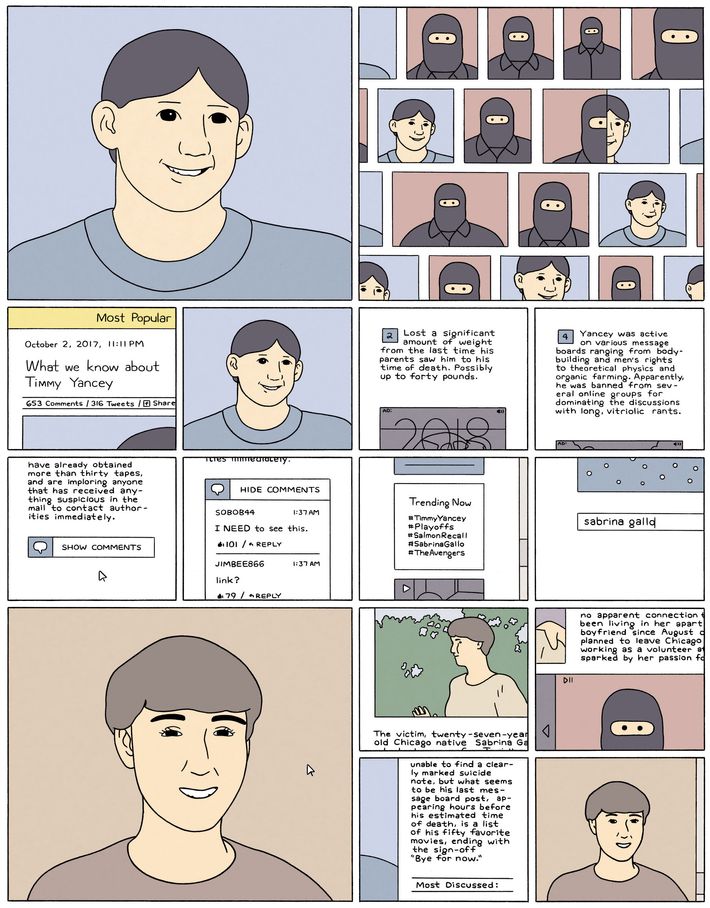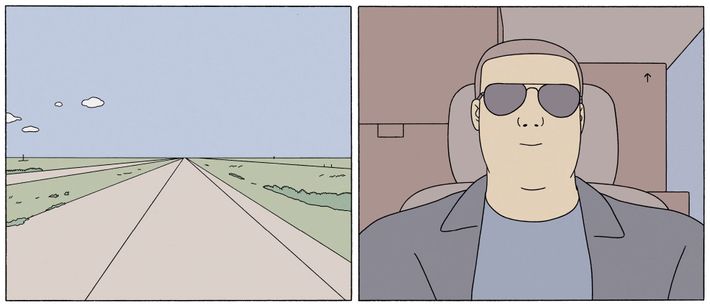
Very mild spoilers for Nick Drnaso’s Sabrina below.
Talk to Nick Drnaso for more than a few seconds and you hear in his laconic, muted voice a longing to be somewhere — anywhere — other than in the spotlight. The Chicago-based Drnaso (pronounced dur-NASS-oh) was already one of the most acclaimed cartoonists working today and his latest graphic novel, Sabrina, is spoken of with hushed awe in comic-book circles. But yesterday morning, the world learned that Sabrina had also become the first-ever comic to make it onto the Man Booker Prize long list. He’s just made history and the eyes of the literary world are pointed his way. Alas and alack for him.
Sabrina is a book that’s difficult to describe, and probably best left undescribed for those who haven’t read it yet. Suffice it to say that it follows a group of unremarkable Americans in unremarkable environments who go through a remarkable trauma and are sucked into the horror that is the contemporary internet rumor cycle. The deliberate and controlled narrative is unnerving enough, but the visuals make the book downright terrifying. The characters are drawn with simple, cartoonish lines, but Drnaso wields each line like a watchmaker pondering how one tiny gear should fit into another, ultimately building something fully realized and unforgettable. But it’s not good enough for Drnaso. Vulture caught up with him by phone on the evening after the long-list announcement.
How and when did you find out you’d been long-listed?
Oh, it was just last week, from the publisher at Granta. They sent me an email giving me a little bit of a heads-up, which was much appreciated.
And how did you feel?
It’s hard not to … It’s hard to convey it without seeming dismissive or ungrateful or something. But I kind of just glossed over the email. For whatever reason, the way I approach making art over the years has just kinda sapped any feeling of satisfaction or excitement I would have about something like that. And I don’t even mean that in such a negative way. I think I just have this wall built up of some kind of self-preservation thing where I don’t let stuff like that in too deeply.
Are there other examples of times you’ve received honors and felt that way?
Yeah, I think anytime it’s something like a prize — which hasn’t come along too often, but when it does, I have a similar feeling. When it’s on a more personal level, like a face-to-face exchange or a friend saying something nice about something I’ve made, it’s a little bit easier. But this one, it’s just so large, it’s hard to know what it’s fully all about. This just feels like this very abstract, far-away thing.
Were you someone who followed the Man Booker Prize in the past? Was it something you were even that aware of?
No, honestly not. Not really.
Have you received more praise for Sabrina than you did for your last book, Beverly?
Yeah, considerably more. I mean, it was sort of an incremental step up. Nothing outrageous. I’m always a little taken aback by press, so I shouldn’t sound so nonchalant about it. It’s more than … I mean, honestly, it sounds like false modesty or something, but it’s more than I feel like the book deserves. I mean, that’s genuinely how I feel, so I might as well just put it out there, whether it sounds genuine or not.
Were you frustrated with the finished book? What do you mean by that?
Yeah, my feelings were pretty intense. I mean, I canceled the book when I finished it. Definitively. For, like, a month. And I tried to move on and then couldn’t and was in a state of complete inaction, going through some personal things, too, but I wound up with what I thought was just this massive failure of a project that was years in the making. And then sort of had some realizations about what I could do to alter the story and started to feel a bit better about it. And obviously, I came around, but it was a real struggle. So it kinda complicates this process of getting recognition for something that was so difficult to make.

What made it so difficult to make? What made that first draft so flawed? That is, if you don’t mind talking about that.
No, no, not at all. I just don’t wanna depress you for the rest of the day.
Go for it, please.
It’s just that the subject matter was taken from very real concerns and fears I was experiencing. So throughout the course of making the book, my girlfriend and I moved in together and those fears only got worse. Luckily, it’s gotten better. We just got married. But at the time, it was kind of a new experience and I didn’t really know what to do about it. It wasn’t going away. And then making the book certainly didn’t help. And by the time it was close to being finished, I just looked at the product and looked at what was going on in the culture and just said, I just made this book about an innocent person who’s abducted and slaughtered and her death is disseminated online and sorta looked at my own life and my own behavior and really just didn’t feel that good about putting out anything personal. It would take too much time to go into, but very personal. It was as much a personal decision as anything. It just felt like too much. So I kinda cracked, a little bit.
I guess I’m having trouble understanding here. Are you saying you didn’t want the book out there because it was too personal, or because the quality of the work was low?
Well, I thought that the book wasn’t … It was a little bit of feeling like it didn’t live up to … It was gonna be a 200-page-plus hardcover graphic novel for upwards of $25 and I sort of have an idea in my mind of what that should be, and I felt like it didn’t live up to that. But then, more so, it was the idea of putting out something with my name on it felt somehow weirdly indulgent. I just had a lot of weird feelings. So I guess it makes sense that it’s coming out really disjointed and not making sense, because some of the stuff I was going through was pretty illogical. I don’t know if that clears it up at all.
You mean events outside your control were illogical? Or your emotions were illogical?
I think they were somewhat illogical. I’m not sure. It’s an entirely fictional story, but at a certain point, it felt … The feeling of having created a fictionalized character that I then murdered for the purpose of a fictional story felt weirdly like … I just felt weirdly awful about it. I couldn’t face it and felt like I was weirdly being exploitative of other people’s pain and misery. It just stirred up a lot of feelings. That might sound kind of wacky, too, but it’s the best way I can explain it.
The second version of the book — you felt better about that one?
I think, when I made the decision, somehow, something just snapped in where I thought, I’m gonna just do my best. There was enough I recognized in the book that I thought I’d put some honest work into it and was working on it harder than I’d worked on anything in my life, and I think I was maybe just dealing with some exhaustion, too. I don’t know if even the finished version was that drastic. Maybe it was more of a mind-set where the change of heart kind of was more internal than anything I actually did to change the book.
About how much of the book was changed from the first version to the second?
Hm. Y’know, I probably only took out six or seven pages, and then added about 30 or so.
I’m guessing the answer is no, but can you tell me what you took out and put in?
I don’t wanna talk about what I took out, if that’s all right.
That’s fine.
But one of the miscalculations, I thought, which I tried to rectify was, towards the end, Sabrina’s sister, Sandra, was becoming a character I was more interested in. I realized there were a lot of missed opportunities of exploring her story in the book. That was just weirdly neglected in my first draft. So I ended up creating a lot of those scenes and kinda placing them throughout the book and hoping it would just seem natural to the progression. Hopefully it’s some needed breathing room from the other narrative of the story. Actually, that was last summer that I was working to add those scenes in, and kind of got more enjoyment out of those sequences than a lot of stuff I’d drawn in the book. So it does feel a little lopsided now. Not that I ever would, but if I had to do it all over again, I would rethink things like that.

What was the overall timeline from initial conception of the ideas for the book to finishing it?
I had the idea in fall and winter of 2014. The character in the air force is based on a friend, so to generate ideas and take photo reference, I went and visited him in Colorado Springs and spent a week with him. He gave me a lot of guidance and assistance in creating that character and filling in the background of that job and that life. Started drawing at beginning of 2015 and finished that first draft in the spring of 2017. Didn’t actually finally finish the book until November, December of 2017.
And what was the initial germ of the idea for the book? Knowing your friend?
I think there was this thought in my mind before I’d met my wife that if, for whatever reason, I wanted to go and have a life do-over … We’d been friends since we were kids and he was sorta living in this isolated situation in Colorado in the air force. I thought I could entertain this thought that I could just take off and live with him if something ever happened. I don’t know why that was in my head. And then, at a certain point, thoughts of abduction and things started occurring to me, somehow they linked up and I imagined this character bowing out and escaping and living in this hermetic bubble. All the other things in the plot just developed pretty organically after that.
What were these thoughts about abduction? Was it that you’d be abducted? Someone you know?
It was all concerns about my wife — girlfriend at the time. We were living separately. It’s not as if anything had happened. I guess those things are just unreasonable fears. But it all depends on how you look at it. If you choose to read a certain kind of news story, then they’re not unreasonable at all and it’s perfectly logical to have a gun in your house because home invasions happen. So that was sort of the feeling: waffling between how accurately I’m seeing the world, the city I live in, walking down the street. I do remember there was a vague kind of threat from someone supposedly involved with the Islamic State that appeared on social media, of them holding a sign in front of a financial or government building in Chicago saying, “We’re in your streets” or something like that. And then Paris and the rash of European terrorist attacks happened not long after that. And then, obviously, it was around the time of a lot of domestic terrorist shootings, which are dealt with in the book: Sandy Hook, those sorts of things.
One thing you didn’t mention there is Infowars and the right-wing online fever swamps that the book deals with. Were you hanging around those communities and observing them?
Not … Well, I think I just had a sense of the narrative that was going on just because I have a morbid curiosity in certain cultures or subcultures. But I honestly didn’t think of my fictionalized version of that world as even being “right-wing” necessarily. I just didn’t think in those terms. I guess those lines have been drawn really distinctly where some of those rants and diatribes in the book seem very clearly to some people as a lot of right-wing kinds of talking points. But I guess that was kinda lost on me at the time. I just saw something different in those ways of thinking and seeing the world which was almost a childlike fear of something being ripped away from you or something being lost, which I tried to convey in that character. Seemingly very vulnerable and clearly his personal life and personal worldview is skewing to the way he sees the world.

Have you been inundated by people getting in touch with you today? Is that overwhelming or painful, maybe?
It’s been fine. I feel a little uncomfortable being almost the representative of the comics medium, at least for today. There’s this … I’m pretty sheltered and pretty protected in my world of comics, which just has this mom-and-pop small feel to it. I just don’t think about it that much. But now, I’m getting in touch with people for whom comics are a bit of a novelty, which is fine, I’m not insisting that they deserve some larger place in the culture or something. Actually, strike all that. I mean, you can include it if you want, but it’s just … I just don’t know why … Yeah, I don’t know what to say about it. I guess I feel a little uncomfortable being on the list, to be honest.
For the reasons you already said?
Yeah, kinda just the same stuff. I don’t know. I just feel uncomfortable with the attention, is what it boils down to. I would honestly be happy if I heard that one of the many, many other cartoonists I love were getting recognition. I could feel happy for them. But I wasn’t really expecting to be the person, for whatever reason, that they singled out. That book, that they decided to put it on the list, it’s just … I don’t understand the process or how that happened.
Are you hoping that you don’t win?
Between you and me? Well … I don’t know. I’m not gonna think about it, actually. I don’t think it’s deserved, I’ll just say that. And that’s genuine. That’s just like how I feel about it. Clearly, it’s all wrapped up in how I feel about myself, so it’s tricky.
Is all this attention distracting you from whatever you’re working on now?
Yeah, that’s always a fear, too, in the back of my mind. I’m sort of easing into another long-term project. I feel like I have to sort of protect and honor the routine of drawing. I guess there is that superstition that something is gonna affect that or spoil it, and it hasn’t been that bad. But when I read something like a New York Times review, it does invite some thoughts into my mind that don’t necessarily help the creative process. There’s a … It kind of slows it down or makes it more self-conscious. You’re more aware of the choices you’re making, which can be good and bad. I guess I should just see it as a good thing. But I think something’s lost. You can’t get as lost or maybe as risky. I might feel a little more stifled. But hopefully that doesn’t happen.
The work you’re doing now: It’s in the early stages? Will it be a while before we see another book from you?
Yeah, I think unfortunately so. I’m 13 or 14 pages in. It’s gonna be more vignetted, like my first book [Beverly]. It’ll just be pieced together more organically. I’m hopefully just gonna think about things in a different way and really try to scrutinize decisions I’m making. I guess I just realized after Sabrina, I can’t make a book like that again. Wouldn’t want to be redundant, and just wouldn’t want to go through that experience again. So that’s all I can hope for, that there’s some growth or some new perspective.
One thing I find fascinating about your visuals is the little smile you sometimes put on a character’s face, even when horrible things are happening and they’re presumably unhappy. Can you talk about why you do that? Or is it not even intentional?
Oh no, there’s a lot of care and concern put into those little tilts and curves in the mouths and stuff, and the tilts of the eyebrows. That’s the thing that I’m always kinda chasing, is having some greater control over what … If I have a specific kind of facial expression that I wanna convey, seeing if I can actually achieve it is the daily struggle and fun of making comics. So all those things, that’s what I get lost in. Those little details. Because the way I draw, actually, the tilts of those mouths are so slight that any slight downward or upward or slanted or sucked-in or gritting the teeth or anything, hopefully … I’m glad you noticed that there’s some slight variation and they’re not all frozen dolls.

Did the Zadie Smith blurb get you excited at all, or was that another thing that made you feel bad?
That was one thing, just because it was someone who I really admire … I mean, I had been on a kick of reading like four of her books in the past year. I’ve still never had any contact with her, but she’s an amazing writer. That was nice. I can sort of take that in and appreciate that.
Have people who have gone through similar traumas to the ones described in Sabrina reached out to you?
No, it’s never happened. I don’t know what that experience would be like. I guess I shouldn’t think too much about it. That wasn’t really on my mind when I was working on it. And it hasn’t happened yet, so we’ll see.
Are you doing anything to celebrate tonight?
No.

